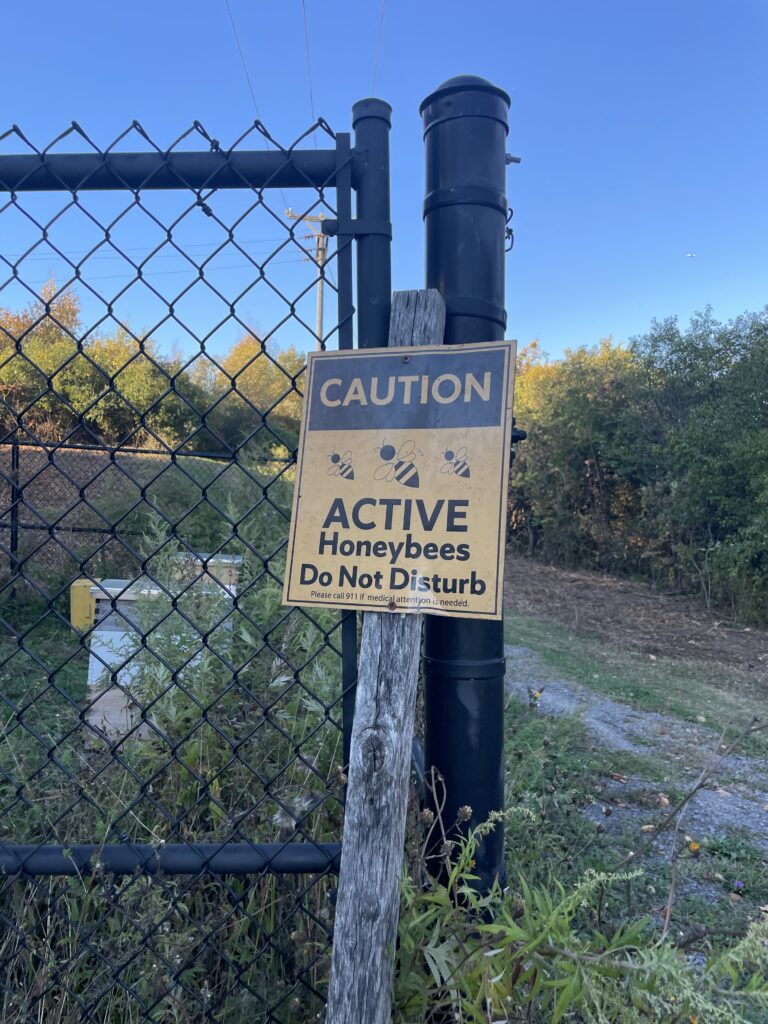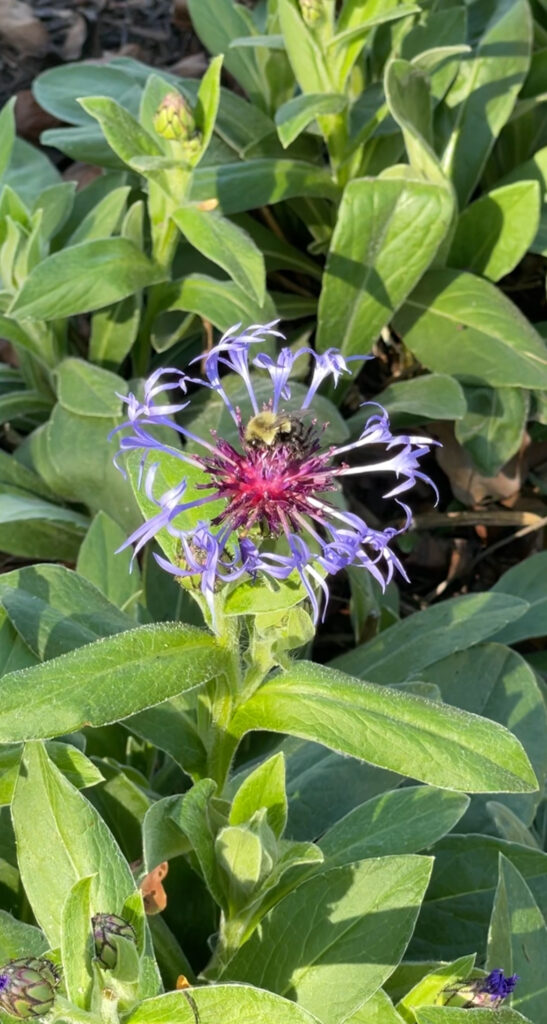VIDEO TRANSCRIPT: South Campus hives promote bee sustainability
Lisa Olson-Gugerty (Syracuse Teaching Professor): There are many different types of bees and honeybees are just one type of bee. Bees are pollinators for much of our food items.
As they decline, there will be changes in the sources of food available to us. There’s a number of reasons. There’s the use herbicides and pesticides, there’s monoculture, and Varroa mites. There’s a multitude of reasons to add to the fact that honeybees are not native to North America.
The hives are on South Campus. Myself and Mary Kiernan wrote a grant. I love them and I wanted to sell honey on campus. I wanted to offer them as an opportunity for research. Honeybees can show us a lot about our local ecology, environment, health, our community’s health.
Keep in mind that they are not aggressively attacking you. This time of year, in the fall, they are getting a little lethargic, a little easily angered. They’re not a threat. Try not to use pesticides if you do come across a swarm or a hive of some sort. I would say, be nice to bees!
SYRACUSE, N.Y. (NCC News) — Lisa Olson-Gugerty didn’t grow up dreaming of becoming a beekeeper. In fact, like many people, she was afraid of bees.
But when a friend got involved with beekeeping, Olson-Gugerty’s interest was piqued. She took a beekeeping class with her daughter and won a starter kit for a hive. What started as curiosity has since turned into a passion.
“I love them,” said Olson-Gugerty, a teaching professor at Syracuse University’s Maxwell School and Falk College.
Now, she has an office filled with bee memorabilia, keeps two hives at her home, and has helped bring several more to Syracuse’s South Campus.
Bringing Bees to South Campus
In 2019, Olson-Gugerty and colleague Mary Kiernan secured a grant to install hives on South Campus.
“I wanted to sell honey on campus. I wanted to offer them as an opportunity for research. Honeybees can show us a lot about our local ecology, environment, and our communities’ health,” she said.

She also hoped the hives would become a collaborative resource for students and professors at both Syracuse and SUNY ESF.
However, in 2024, while teaching abroad in London, Olson-Gugerty had to hand over the care of the hives to Syracuse Honey, a local beekeeping and bee removal business.
Syracuse Honey
Unlike Olson-Gugerty, Bob Faulkner, the owner of Syracuse Honey, always knew he wanted to be a beekeeper.
“When I was 12, I wanted to be a beekeeper, and it didn’t happen. So, my whole life I spent thinking about how I could be a beekeeper,” he said. “Finally, when I retired, I thought it was now or never.”
Syracuse Honey’s mission is to save bees, one colony at a time. Faulkner works to safely remove bees from clients’ properties and relocate them to one of his many bee yards throughout Onondaga County.
According to Faulkner, the 10 hives on campus contain around 60,000 bees each. In the past couple of years, Faulkner has harvested around 10,000 pounds of honey from the 150 hives he manages, which he sells to the local community on his website and at various markets.
“I feed the bees and give them medicine to keep them healthy, and we work together to produce a lot of honey,” he said.
Declining Bee Populations
Bees, especially honeybees, play a vital role in global food systems by pollinating crops. Statistics show that bees pollinate one in every three bites of food we eat.
But, as important as they are, honeybees are not native to North America, and their populations are declining.
This is due to several reasons, including:
- The use of pesticides and herbicides
- Varroa Mites
- Habitat loss
- Climate Change
- Monoculture
Olson-Gugerty and Faulkner both warn that the declining bee populations will likely impact food availability.
“Food insecurity for all of America and the planet is the repercussion of this,” Faulker said.
How to Help
Even small actions can help these important pollinators. Faulkner encourages Central New York residents to support a local beekeeper.
“Any time you buy local honey, you are helping the beekeepers who are then helping the bees,” he said.
Olson-Gugerty hopes people will be mindful of the bees around them.

“If you do come across a swarm or hive of some sort, ask someone to move it for you,” she said. “There are plenty of companies, including Syracuse Honey, that will come extract them from your property.”
And remember that they are not a threat. As bees prepare for their winter hibernation, they become more lethargic and sluggish.
“Plant native plants, provide areas for bees to thrive, limit the use of herbicides and pesticides… and I would say: be nice to bees!”
